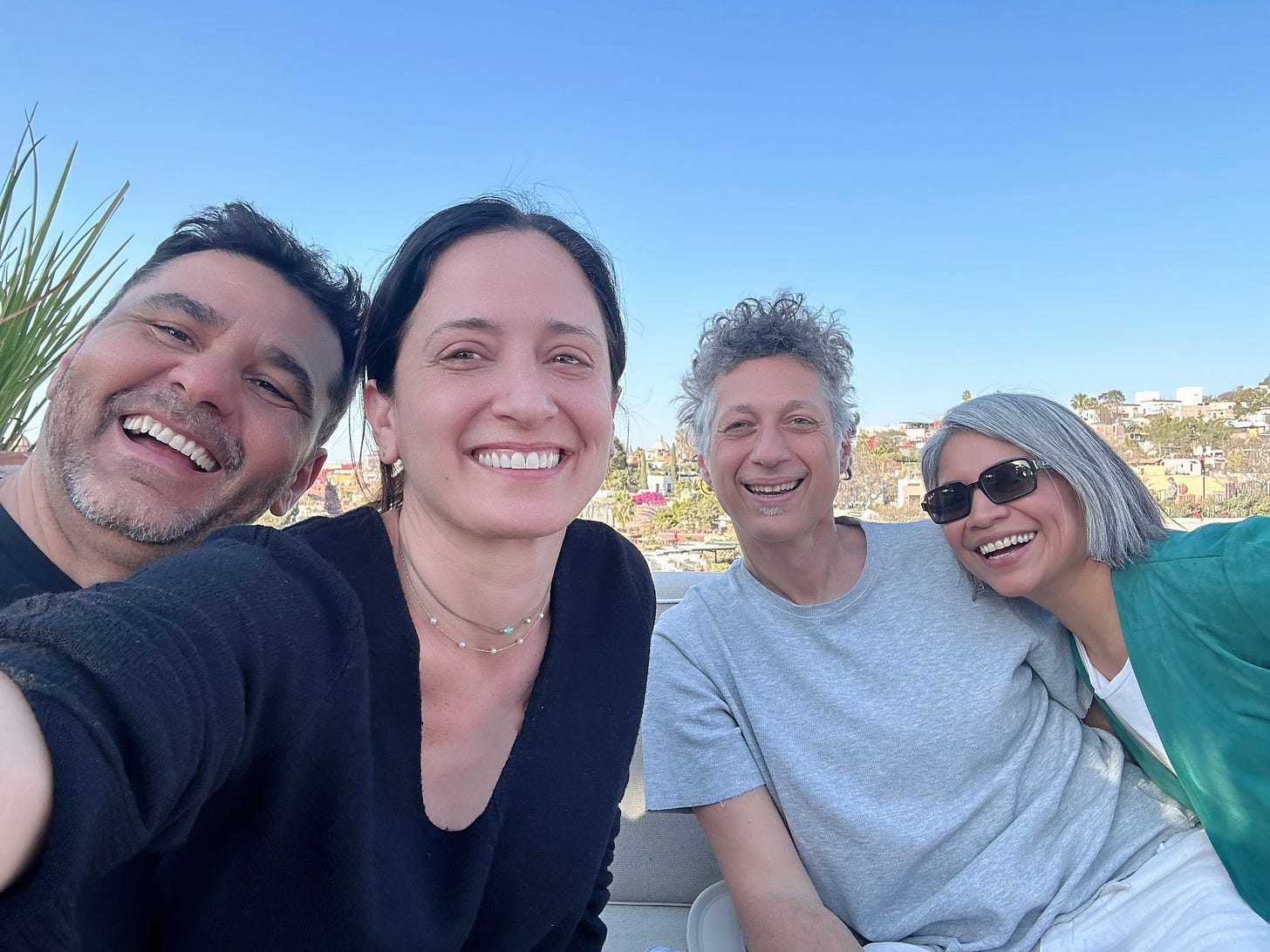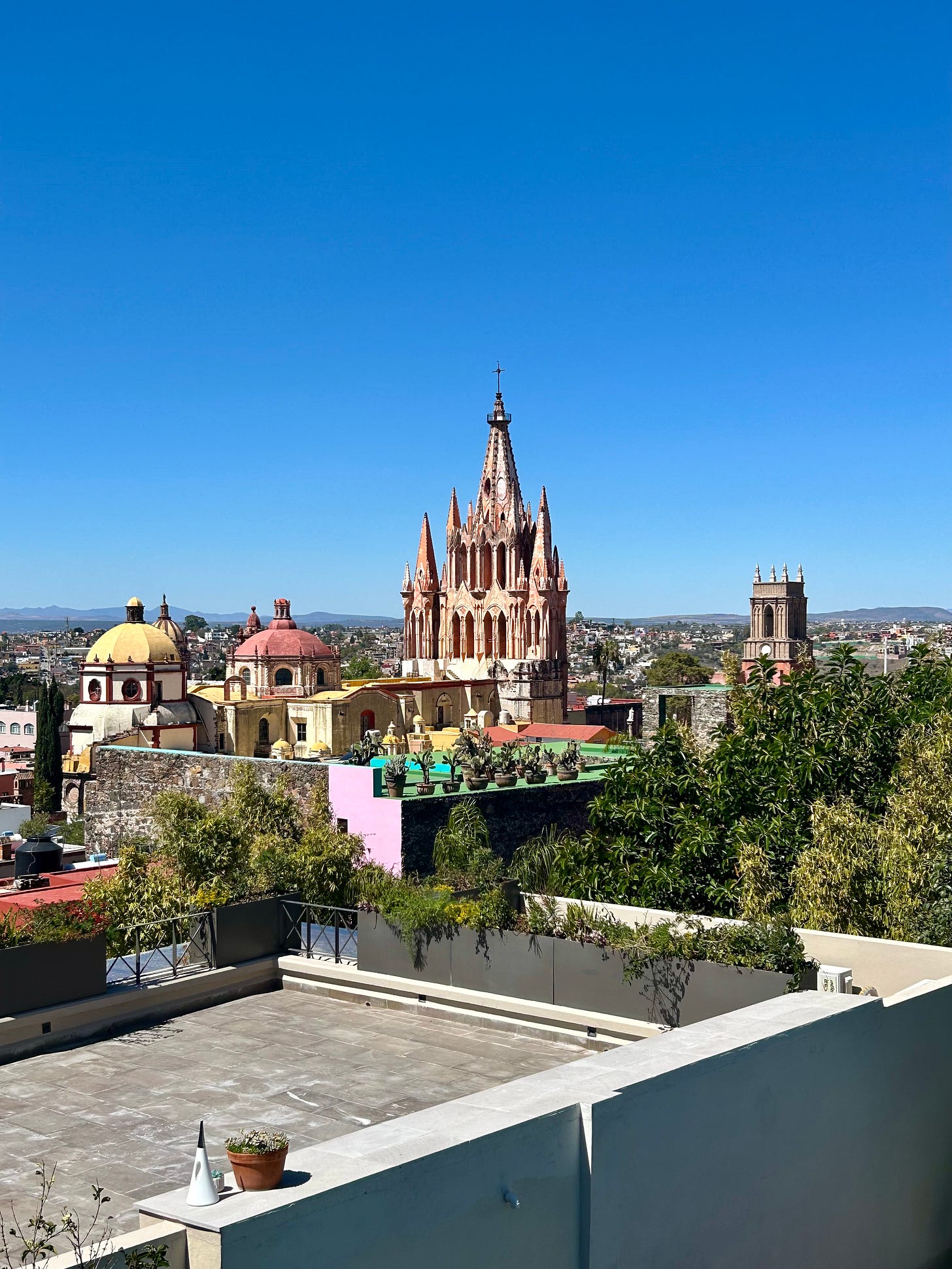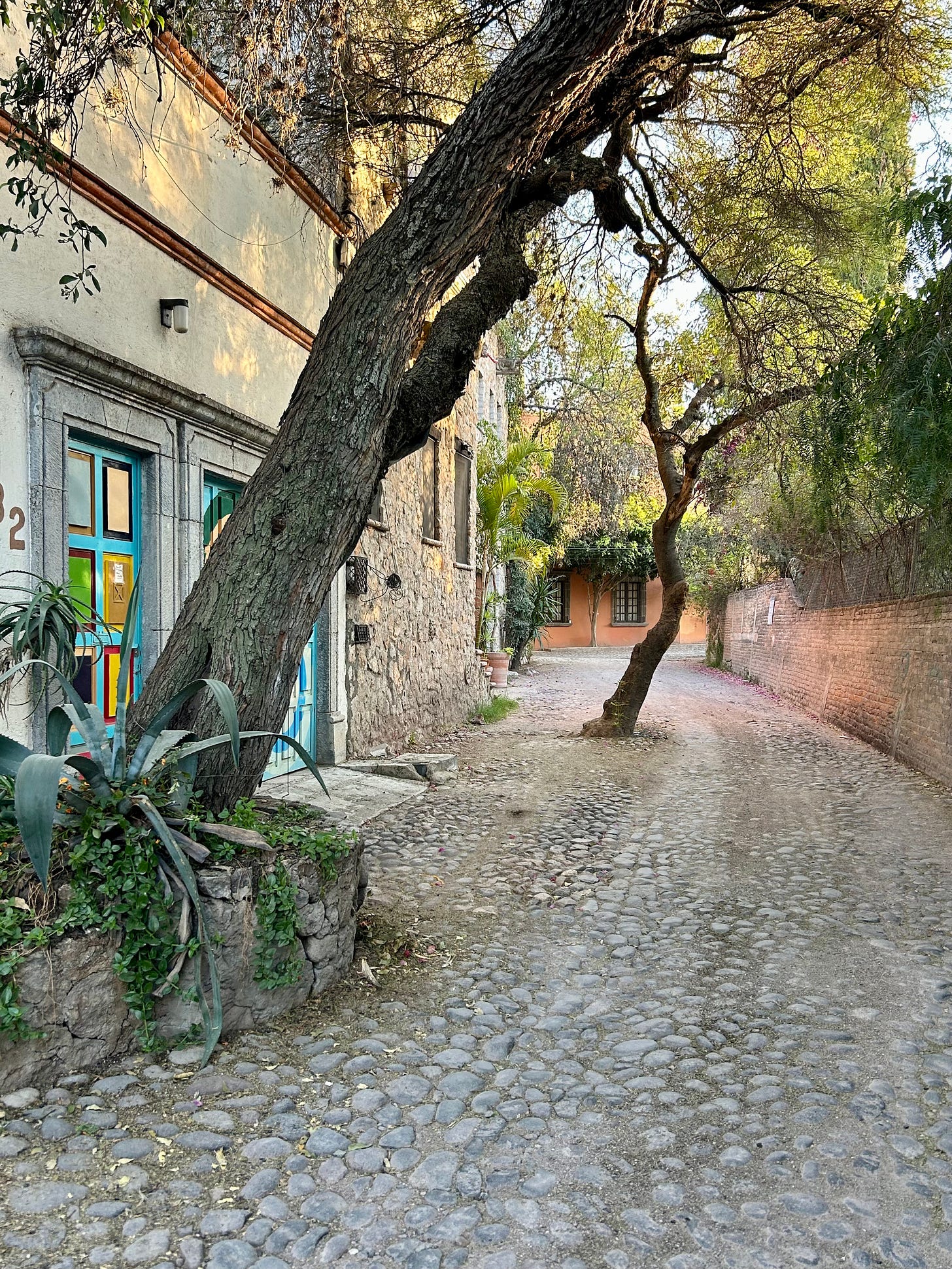I just finished teaching at a writers’ conference in San Miguel de Allende, Mexico, where I lived from 2016 to 2018. I still have friends there, and friendly acquaintances, too. On my last night in town, a bunch of us drank beers on a rooftop, and it got me thinking about relationships that feel like a cozy, old sweatshirt, not because we’re close, but because we knew one another when we were younger than we are now. Maybe we didn’t even hang out much back when we could have, but still, they’re part of the era I spent in the place, part of my nostalgia. I don’t know them intimately enough to feel wounded by them. I don’t owe them anything more than I give them, nor do they owe me.
Maybe one was the kind to lift me off the ground when he hugged me, a small annoyance in a world of grand annoyances. Or the kind to high-five me like a teammate. Or to talk too much, until my eyes would skid around, looking for an exit. Or to sit silently, which would make me anxious, because I always feel responsible for everyone’s fun.
Despite people’s quirks, despite my own restlessness, despite having moved from every place for a reason, or multiple reasons, I love my acquaintances—in part because our knowing one another is a staggering statistical improbability: Of the hundred billion people who have ever lived, we’re among a couple hundred thousand who simultaneously populated a city.
Maybe once, years ago, I asked one, Will you watch my drink while I go to the bathroom? Maybe I ran into one on the street and we laughed together because we were wearing the same shirt. Maybe one told me that a mutual friend died, and whenever I think of that friend, I recall my acquaintance who broke the news.
I remember an evening in another Mexican town I lived in for a year, when I was having an existential crisis that was more likely PMS. An acquaintance’s hello, her smile, the deep humanness of her eyes made me cry. She was so kind. She told me about something similar that she was going through. That’s a listening faux pas, of course: Ask questions; don’t connect everything back to yourself. But sometimes we need the reminder that our miseries aren’t singular.
When you’re a traveler, you have a glut of acquaintances. When you live the way I have for years—on the road, rootless—sometimes acquaintance-ships stand in for friendships. I have some of my deepest conversations with acquaintances. And when an interaction ends, I might feel deserted. I might long for more. But if I got more, I’d be in danger of learning too much about a person. Or she about me. Too much information can be a relationship death knell.
I rarely befriend acquaintances, rarely see someone around so much, we gradually work up to friendship; I’m more likely to befriend strangers. That’s because when I meet someone, I know quickly if I want to get serious. When I met Julie at 19, and my best friend Anna at 22, the love at first sight I felt registered as emergency: I must make these women my friends.
Some of my favorite scenes from literature center interactions among characters who aren’t strangers, but aren’t exactly close. I’m thinking of What We Talk About When We Talk About Love, Raymond Carver’s story about two couples getting drunk together, and those lines toward the end: I could hear my heart beating. I could hear everyone's heart. I’m thinking of party scenes in Sally Rooney’s novels and in The Great Gatsby. I’m thinking of the girls getting food poisoning in The Bell Jar: There is nothing like puking with somebody to make you into old friends.
I’m thinking of a middle-of-the-night scene toward the end of Prep by Curtis Sittenfeld, a novel set in a boarding school. Everyone gathers outside for a fire drill, and the protagonist feels not the annoyance that her classmates feel, but nostalgia and camaraderie: The fire drill is finished, but so is everything else. Did we believe we could pick and choose what passed quickly?
As I was leaving that rooftop bar in San Miguel, I said something to one of my acquaintances about seeing each other next year if I taught again at the conference. Laughing, he said, “Fuck you—‘next year?’” So I said I’d come back sooner. Then we hugged, knowing that I wouldn’t come back sooner, and that whether or not I came back sooner was immaterial to both of our lives. It was hard to say goodbye. At the same time, I wanted the goodbye to be over already because I was lying to his face.
From there, it took 20 minutes to walk the cobblestone streets back to my Airbnb. I passed a mural I remembered—a fox with a long, looping body, spanning a brick wall. And another street I remembered, where a tree grows in the center, forcing cars to slow to a crawl, to inch their way around it.
I thought of an acquaintance who lived off that street, who for reasons I can’t recall was holding onto my yoga mat for me. He was a painter whose studio doubled as a rock-climbing gym. I saw him a couple more times before I moved away and he’d say, “I still have your yoga mat in my studio,” or I’d say, “I know I need to come get my yoga mat.” We’d laugh because it became absurd, this yoga mat unfurling between us. In yoga classes, the point of a mat is to claim your space, its edges functioning as boundaries, but in this case, the mat was the one thing we shared.
Eventually I left San Miguel and never saw that acquaintance, or that yoga mat, again. It was a perfectly good yoga mat, but I was too transient to own one. It wasn’t worth dragging all over the world, but from time to time, I miss it.
Love,
Diana
P.S. A prompt: Write about your nostalgia for someone you aren’t close with.
P.P.S. How do you feel about your acquaintances? Let me know in the comments.







This makes me nostalgic for San Miguel! That tree in the road! Our rooftop bar! Us walking home at night and me leading the way because of your funny sense of direction. Our friends, our "dad", our long talks, laughing for hours into the night. All those weirdos. All those talkers. All those people we really do love after all.
Bill was the facility director when I worked in a children's residential treatment center, and we were both social workers. He was handsome and blonde and wore a leather bomber jacket to work every day. The women who worked there were all in lust with him. I run into him once every few years; the last time, he and his wife were just starting out on a run, setting his watch for the time, when my friend and I were walking in the same neighborhood and happened upon them. He stopped, and we caught up. We shared about four years in time working to have children's lives be bearable, better than they were, transformed even--a lofty goal. One time, something unbearable had happened to a child on my watch. When he saw me that day, he came up and just gave me a long hug. Some things just can't be said in words. That is structural language, something else I learned about somewhere else . . . our first language as babies.